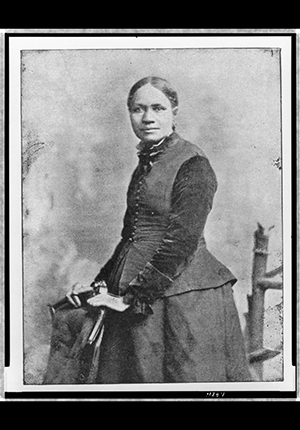Historic Document
We Are All Bound Up Together (1866)
Frances Ellen Watkins Harper | 1866

Library of Congress, Prints and Photographs Division
Summary
During Reconstruction, suffragists and their abolitionist allies worked together to promote a vision of universal voting rights. For these reformers, the push for voting rights was not about race or sex. It was about post-Civil War America’s commitment to universal rights. A key figure in this fight was Frances Ellen Watkins Harper. Born free, Harper was educated in Baltimore. In 1852, she moved to Philadelphia to join the abolitionist speaking circuit. Gaining prominence as a poet and writer, she spoke at the 1866 National Woman’s Rights Convention. There, she advanced a broad vision of universal rights: “We are all bound up together in one great bundle of humanity, and society cannot trample on the weakest and feeblest of its members without receiving a curse in its own soul.” However, Harper also made it clear that suffrage may have been one goal for African American women, but suffrage alone was not enough to ensure them equal citizenship in post-Civil War America.
Selected by

The National Constitution Center
Document Excerpt
I feel I am something of a novice upon this platform. Born of a race whose inheritance has been outrage and wrong, most of my life had been spent in battling against those wrongs. But I did not feel as keenly as others, that I had these rights, in common with other women, which are now demanded . . . We are all bound up together in one great bundle of humanity, and society cannot trample on the weakest and feeblest of its members without receiving the curse in its own soul. You tried that in the case of the Negro. You pressed him down for two centuries; and in so doing you crippled the moral strength and paralyzed the spiritual energies of the white men of the country. When the hands of the black were fettered, white men were deprived of the liberty of speech and the freedom of the press.
Society cannot afford to neglect the enlightenment of any class of its members. At the South, the legislation of the country was in behalf of the rich slaveholders, while the poor white man was neglected. What is the consequence today? From that very class of neglected poor white men, comes the man who stands today, with his hand upon the helm of the nation. He fails to catch the watchword of the hour, and throws himself, the incarnation of meanness, across the pathway of the nation. My objection to Andrew Johnson is not that he has been a poor white man; my objection is that he keeps “poor whites” all the way through. That is the trouble with him.
This grand and glorious revolution which has commenced, will fail to reach its climax of success, until throughout the length and breadth of the American Republic, the nation shall be so color-blind, as to know no man by the color of his skin or the curl of his hair. It will then have no privileged class, trampling upon outraging the unprivileged classes, but will be then one great privileged nation, whose privilege will be to produce the loftiest manhood and womanhood that humanity can attain.
I do not believe that giving the woman the ballot is immediately going to cure all the ills of life. I do not believe that white women are dewdrops just exhaled from the skies. I think that like men they may be divided into three classes, the good, the bad, and the indifferent. The good would vote according to their convictions and principles; the bad, as dictated by prejudice or malice; and the indifferent will vote on the strongest side of the question, with the winning party.
You white women speak here of rights. I speak of wrongs. I, as a colored woman, have had in this country an education which has made me feel as if I were in the situation of Ishmael, my hand against every man, and every man’s hand against me. Let me go to-morrow morning and take my seat in one of your street cars — I do not know that they will do it in New York, but they will in Philadelphia — and the conductor will put up his hand and stop the car rather than let me ride.
In advocating the cause of the colored man, since the Dred Scott decision, I have sometimes said I thought the nation had touched bottom. But let me tell you there is a depth of infamy lower than that. It is when the nation, standing upon the threshold of a great peril, reached out its hands to a feebler race, and asked that race to help it, and when the peril was over, said, “You are good enough for soldiers, but not good enough for citizens.




